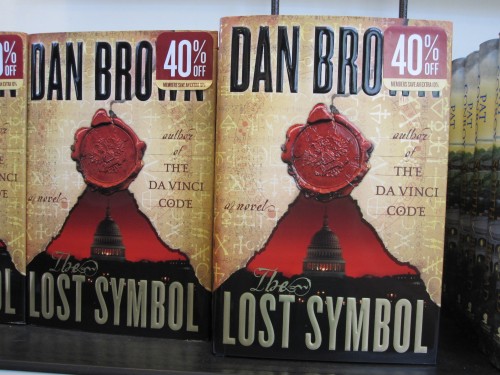
I see the future, I bend my thought to it: millions turning to these words and taking meaning from them, imbuing them with personal meaning; individuals comprehending “untold” mysteries written secretively in every building; a double decker bus with a speaker, the supreme leader shouting interpretations through the streets. That’s right, I see… The Lost Symbol Tour of DC. Now, this providential power of my mind to see this eventuality would be, in the world of Dan Brown’s The Lost Symbol, dramatic and surprising, never-before considered proof of the illimitable powers of the human mind. Use a heavy hand of the occult dressing and the secrecy sauce, and you can see the face of the Madonna in any piece of iceburg lettuce. This is Mr. Brown’s recipe–smash together enough philosophical minds, add a secret society, some underground passageways and a beastly sadomasochistic villain and you’ve got $1 million in first-day sales. Unfortunately the devices so intoxicating in The Da Vinci Code are ultimately working for a less sexy philosophical revelation in this latest installment. I raced along with the now-familiar “every-professor” Robert Langdon, pushing him on, only to arrive at the finish line going, “Wait. That’s it?!”
This is all sad to say, because I was really rooting for D Brown. I feel like it has to be hard being D Brown. This is a man who sat in watching undergrad creative writing examples and courses at Amherst with a man who has been heralded as one of the great literary minds of our generation, David Foster Wallace. He then went on first to a Barry-Manilow-esque, short-lived music career in LA, before writing 187 Men to Avoid under the pseudonym Danielle Brown. He wanted to be a writer, and he got his wish– but even as millions of educated individuals voraciously consumed his thrillers, they castigated his writing. He’s no Hemingway. That’s no Faulknerian prose. Then again, maybe I shouldn’t feel bad– The Da Vinci Code sparked an international fervor, making Brown a household name and assuredly making him something few writers become, a rich man. After myriad criticisms relating to not only Brown’s writing but his research–its factuality and originality–you could see why the man would take 6 years to write, and presumably carefully edit, the next installment. Continue reading

